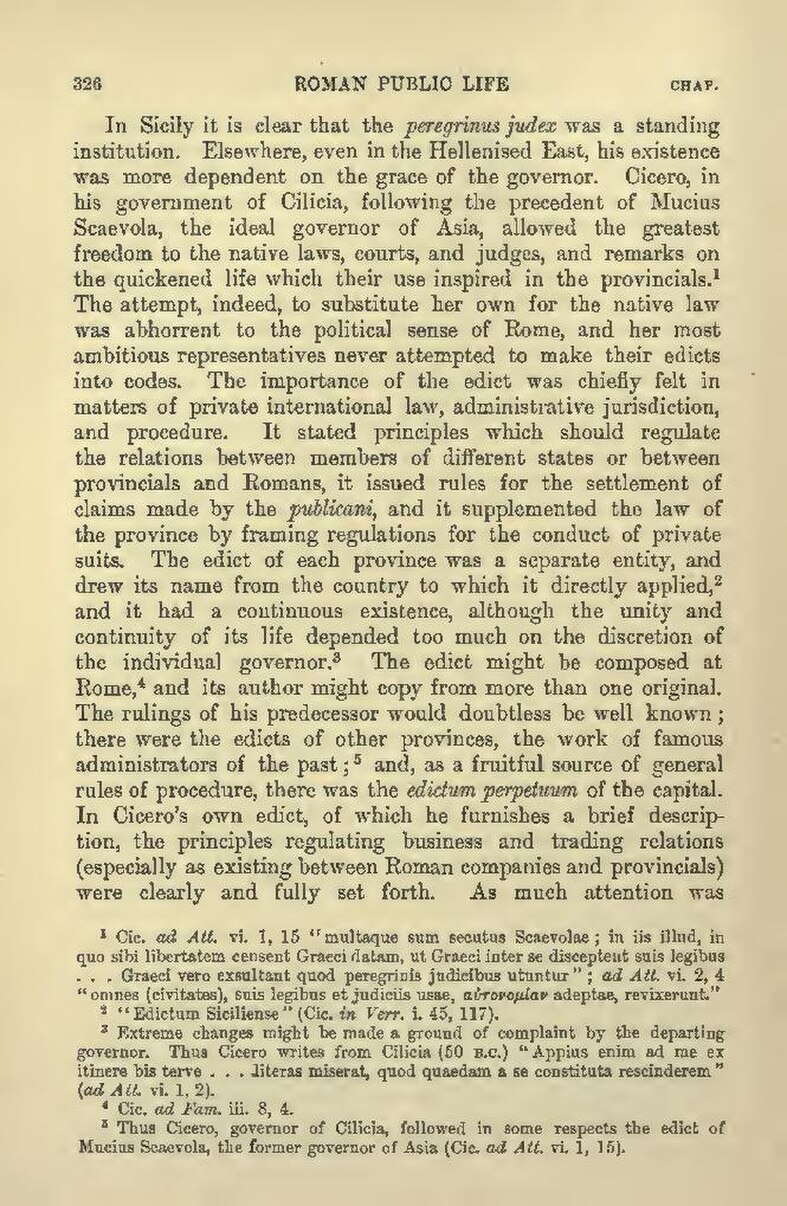In Sicily it is clear that the peregrinus judex was a standing institution. Elsewhere, even in the Hellenised East, his existence was more dependent on the grace of the governor. Cicero, in his government of Cilicia, following the precedent of Mucius Scaevola, the ideal governor of Asia, allowed the greatest freedom to the native laws, courts, and judges, and remarks on the quickened life which their use inspired in the provincials.[1] The attempt, indeed, to substitute her own for the native law was abhorrent to the political sense of Rome, and her most ambitious representatives never attempted to make their edicts into codes. The importance of the edict was chiefly felt in matters of private international law, administrative jurisdiction, and procedure. It stated principles which should regulate the relations between members of different states or between provincials and Romans, it issued rules for the settlement of claims made by the publicani, and it supplemented the law of the province by framing regulations for the conduct of private suits. The edict of each province was a separate entity, and drew its name from the country to which it directly applied,[2] and it had a continuous existence, although the unity and continuity of its life depended too much on the discretion of the individual governor.[3] The edict might be composed at Rome,[4] and its author might copy from more than one original. The rulings of his predecessor would doubtless be well known; there were the edicts of other provinces, the work of famous administrators of the past;[5] and, as a fruitful source of general rules of procedure, there was the edictum perpetuum of the capital In Cicero's own edict, of which he furnishes a brief description, the principles regulating business and trading relations (especially as existing between Roman companies and provincials) were clearly and fully set forth. As much attention wasadeptae, revixerunt."]
- ↑ Cic. ad Att. vi. 1, 15 "multaque sum secutus Scaevolae; in iis illud, in quo sibi libertatem censent Graeci datam, ut Graeci inter se disceptent suis legibus . . . Graeci vero exsultant quod peregrinis judicibus utuntur"; ad Att. vi. 2, 4 "omnes (civitates), suis legibus et judiciis usae, [Greek: autonomian
- ↑ "Edictum Siciliense" (Cic. in Verr. i. 45, 117).
- ↑ Extreme changes might be made a ground of complaint by the departing governor. Thus Cicero writes from Cilicia (50 B.C.) "Appius enim ad me ex itinere bis terve . . . literas miserat, quod quaedam a se constituta rescinderem" (ad Att. vi. 1, 2).
- ↑ Cic. ad Fam. iii. 8, 4.
- ↑ Thus Cicero, governor of Cilicia, followed in some respects the edict of Mucius Scaevola, the former governor of Asia (Cic. ad Att. vi. 1, 15).
